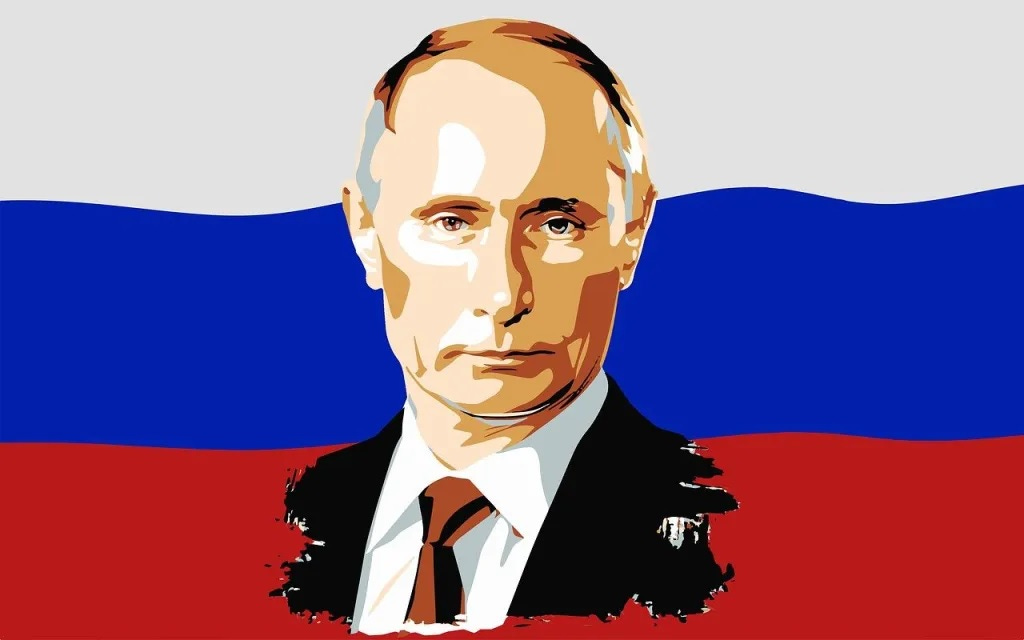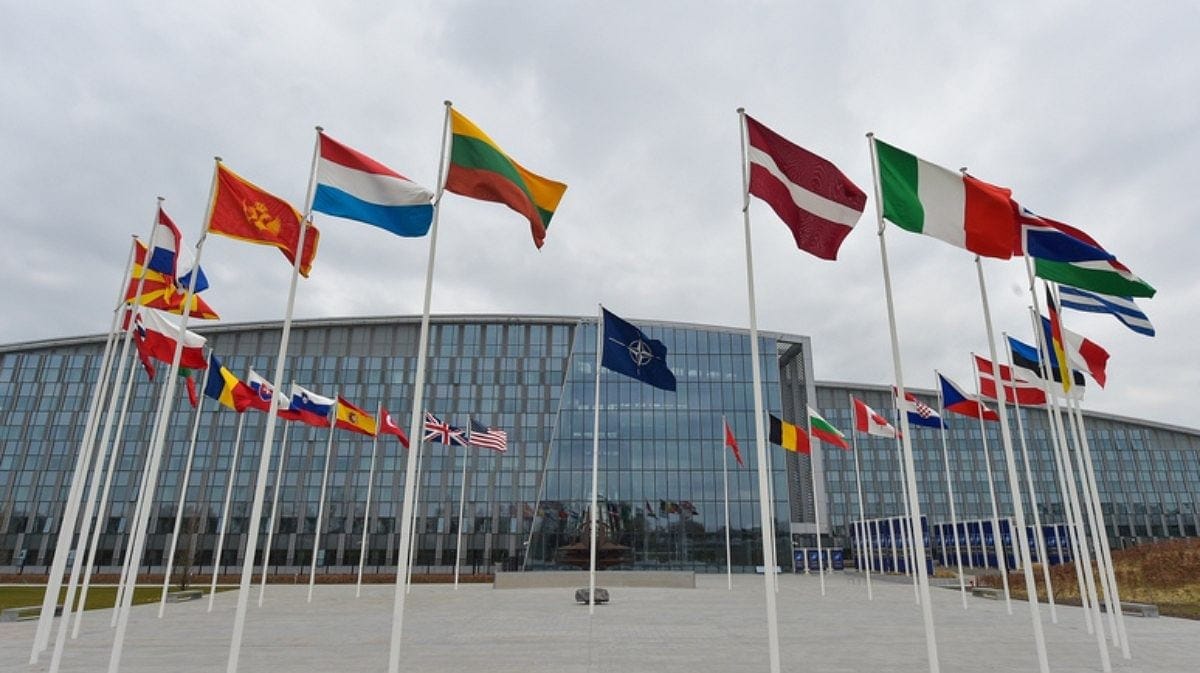Biden has failed to understand Putin and Russia in addressing the Ukraine crisis
At this writing, the U.S. had not reduced imports of Russian oil. At Thursday’s closing oil price of $109.51, we are pumping more than a half a billion dollars per week into Russia’s wartime economy.
Putin fancies himself the savior of Russian political and societal ideology through the control of land mass and strategic position. His influence is not just something which claims to define Russian interest, but even Russian media itself. (Photo Illustration: Debra Petty/America’s Conservative Voice) _______________________________________________________________________________________________________________
The Biden administration thought it could scare the Russians away from Ukraine, refusing on principle to negotiate with Vladimir Putin.
The Russian strongman was not frightened off. He pulled the trigger and invaded a sovereign nation. It is clear he sees Biden ― and America ― as weak.
Now, due to the miscalculations of Biden and other democratically elected officials worldwide, we and our allies are without an effective response. Brave Ukrainian military personnel and civilians are dying to defend their country and their freedom as they cry out to the West for help, for military intervention.
The unpleasant reality is the Biden administration, while claiming to have “united our allies” to respond to the invasion, is actually far behind Europe’s reactions and have yet to cut off Russian oil imports to the U.S. Biden has utterly failed to execute a strategic tactical policy to deal with Russia’s designs on Ukraine and the rest of Eastern Europe.
A superpower shouldn’t make threats if it won’t back them up. The United States and NATO — which don’t agree on much — do agree that no one will use military force to defend Ukraine. That means all the threats must be economic and political, thus eliminating the only show of force Putin understands.
Putin does not care about the international sanctions. He isn’t worried about losing access to international banking systems. He doesn’t care if Europe and the U.S. stop importing his oil and gas. China will take up the slack, and perhaps increase Russian revenues by buying their petroleum products.
Worse, the U.S. ― having successfully urged Europe to halt such imports ― hypocritically continues to import Russian oil at a record-setting pace under Joe Biden. Petroleum imports from Russia, one of our two biggest enemies in the world, topped 670,000 barrels of oil per day in 2021, despite the threat even then of Russia’s invasion of a sovereign country for much of the year.
At this writing, the U.S. had not reduced imports of Russian oil. At Thursday’s closing oil price of $109.51, we are pumping more than a half a billion dollars per week into Russia’s wartime economy at the same time we are attempting to get them to leave Ukraine.
How stupid does that make us look? When will Biden stop importing Russian oil and replace it with our own oil production, currently being held hostage by those running the false-flag operation of “global warming”? The short answer is, he won’t. He owes those climate frauds too much in political capital.
Another problem ― actually, an error ― on the part of the U.S. and its allies is that they are dealing with Putin in 21st century terms of power and world standing while he adheres to 19th century definitions of those personal and national identities. Our Western view of national power lies in the ability to influence opinion and in the economic status of a nation. Putin does not.
Putin may have grown up a communist and honed his skills as a leader and strategist in the KGB, but his actions and ideology more closely align with czarist/Fascist oligarchy ― a government system formed by a few people who buy their power and prestige with their wealth. Such a government measures its standing and prestige in land and projection of power.
Putin fancies himself the savior of Russian political and societal ideology through the control of land mass and strategic position. His influence is not just something which claims to define Russian interest, but even Russian media itself.
Young Russians, however, are not sold on the dominance of the old-school Soviet-style culture to which Putin adheres. The consequence of this is that two entirely separate media machines operate in Russia. Putin is not just a strongman to the average older Russian, he is their favorite live stream podcaster. This is something which, in the West, we don’t quite understand.
Russia’s youth are not committed to the old-school Soviet culture and have taken to the streets of Moscow and other major Russian cities to protest Putin’s invasion of Ukraine. (Photo: [Aleksandr Yanshev/Associated Press) _______________________________________________________________________________________________________________
But neither do the GenXer and GenZer generations under Putin’s rule. The ready availability of the internet and other social media feeds their desire for freedom, liberty and personal rights.
That is why over 8,000 of them have been jailed over the first eight days of the war in Ukraine. They have taken to the streets in direct defiance of Putin’s anti-dissident laws to protest the invasion of Ukraine, the killing of Ukrainian civilians and the attack on democracy ― all war crimes according to the Geneva Convention.
Young Russians desperately want democracy for themselves and ― as the Ukrainians ― are willing to pay a price to achieve it.
There remain few Ukrainians who identify as having ties to Russia, who support Putin. He has followers in other former Soviet bloc nations, but as in Russia, they are of the older generations. He can no longer depend on the loyalty of those former satellite states, or even his own native Russia.
Putin will not accept reality. He uses tanks indiscriminately, sending them into Kazakhstan less than two months ago to quell the coup d’etat there. Now he uses them against Ukraine. Putin wants to remain the primary #influencer in Russia, but he is losing the battle, particularly with his irrational decision to invade Ukraine.
Putin doesn’t want NATO anywhere near him threatening to take his audience ― which puts Latvia, Estonia, Lithuania and other former Soviet Bloc nations in danger should Zelenskyy’s Ukraine fall. Many are already NATO members on his border.
The irony is that Putin firmly believes that Russia cannot be a great power without being able to control or influence most of the former Soviet Union. That is just one reason he decided to invade Ukraine.
The likelihood he intends to threaten other former satellites is high. Putin thinks he must control Ukraine and its foreign policy in order to “protect” Russia. It would be natural for him to project that attitude toward other former Soviet republics.
His invasion, though, has virtually guaranteed he will fail, even if he conquers Ukraine. On Wednesday, less than 24 hours after President Voldymry Zelenskyy signed the application, The European Union (EU) admitted Ukraine for membership. It may well be that, once this conflict is over ― and assuming Ukraine manages to survive in some form ― it will also apply, and be admitted, to NATO.
Russia is already being called a “pariah” in the world. Continuing this action against a sovereign nation will only make Putin and Russia more vilified, more condemned, more isolated. Putin doesn’t care.
His view of a proper world order is that Russia can only be a respected through the paranoid projection of power, might, force and tyranny familiar to the world under Lenin, Stalin, Khrushchev and Brezhnev. In that, Putin and his country become even more dangerous than China. His paranoia ― as well as the corporate paranoia of his older population ― makes him too unpredictable.
That leaves the West in a precarious position.
After the fall of the Berlin Wall and the dissolution of the old Soviet Union, many members of NATO drastically cut defense spending ― buying into the so-called “peace dividend” promoted by U.S. President George H.W. Bush ―at the same time that the treaty organization expanded.
Many former Soviet satellites ― Poland, Latvia, Estonia, Lithuania, among 10 others ― joined NATO immediately after the end of the Cold War while the original 16 members were reducing their commitment to their own defense and that of other treaty members.
Only the United States maintained a reasonable defense posture aimed at protecting ourselves as well as NATO and the Southeast Asian Treaty Organization (SEATO) that continues to offer support to Taiwan, Australia, India, Japan, The Philippines and four other nations that are signatories to the treaty.
Having reduced defense spending during the so-called “peace dividend” following the collapse of Soviet Russia, NATO members now scramble to give a forceful response to the invasion of Ukraine. (Photo: NATO.int) _______________________________________________________________________________________________________________
Now, NATO members are scrambling to answer Russian aggression against a non-NATO member that, if it falls, will open most of eastern Europe to threats of invasion by Putin’s military. How that plays out over the next few days and weeks is anyone’s guess.
The right move, the clever move, would have been serious arms control negotiations with the Russians when Russian President Vladimir Putin demanded them. Putin handed the Biden administration a clear opportunity and was ignored.
All indications are that it appears the Russians are afraid of NATO. If that is the case, the U.S. and its allies in Europe could have worked out deals to protect both eastern and western European security. Russia claimed at the time it was concerned about its own security, a hitching post upon which NATO concerns could also have been tethered.
The same possibility for negotiations had applied to Ukraine. The Russians argued that the Ukrainians should negotiate the terms provided for by the 2015 Minsk Protocols. Putin wanted Washington to apply pressure on Kyiv to follow through. From that aspect, Biden did at least one thing right in not making such a demand, given Russia’s demands were outside the guidelines of the agreement.
We therefore find ourselves as a nation in a difficult and seemingly untenable situation.
We do not want a direct confrontation with Russia. Equally important is to preserve Ukraine’s sovereignty in the face of Russian aggression. We must consider the possible danger to other NATO nations should Ukraine fall. We must also factor in the possibility of China launching an effort to bring Taiwan to heel and make it the wayward province it has long contended the democratic island republic to be.
It appears to be a no-win situation. The best the West and the democratic East can hope for is that the dissidents in Russia will manage to depose Putin and his cadre of oligarchs. That is unlikely.
The worst case is that Russia conquers Ukraine, laughing at the West’s economic and political sanctions that truly have no hope of success against the invasion. Then Putin may be emboldened to turn toward Poland, Latvia, Estonia and Lithuania in his effort to reconstitute the Soviet Empire.
Such a reality should force Biden to step up, standing strong for NATO allies. At least, one would hope.
Then again, its Joe Biden. Perhaps there is no hope.
Mike Nichols is an advocate of the counterrevolution with a four-step plan to defeat Leftist Fascism: We Organize. We Stand. We Resist. We Fight. He is a regular contributor to several conservative news websites and has a regular blog and Facebook presence at Americas Conservative Voice-Facebook.







